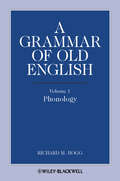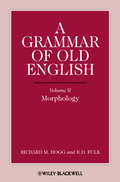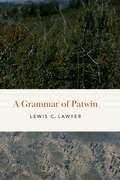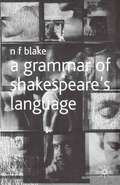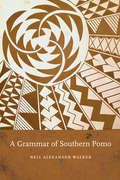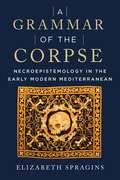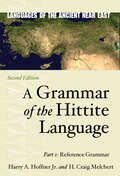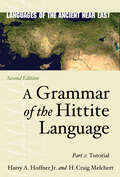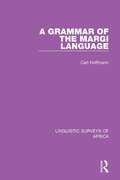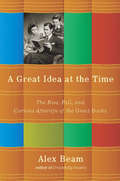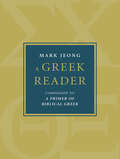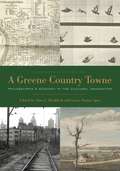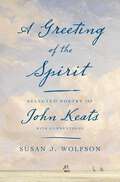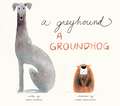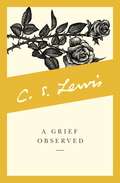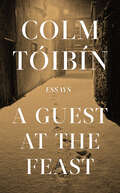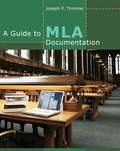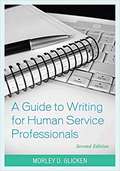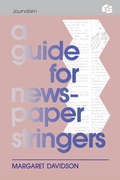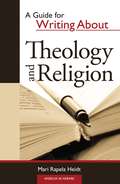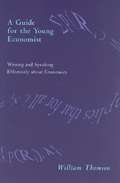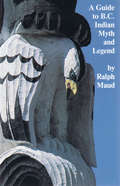- Table View
- List View
A Grammar of Old English, Volume 1: Phonology
by Richard M. HoggFirst published in 1992, A Grammar of Old English, Volume 1: Phonology was a landmark publication that in the intervening years has not been surpassed in its depth of scholarship and usefulness to the field. With the 2011 posthumous publication of Richard M. Hogg’s Volume 2: Morphology, Volume 1 is again in print, now in paperback, so that scholars can own this complete work. Takes account of major developments both in the field of Old English studies and in linguistic theory Takes full advantage of the Dictionary of Old English project at Toronto, and includes full cross-references to the DOE data Fully utilizes work in phonemic and generative theory and related topics Provides material crucial for future research both in diachronic and synchronic phonology and in historical sociolinguistics
A Grammar of Old English, Volume 2: Morphology
by Richard M. Hogg R. D. FulkA Grammar of Old English, Volume II: Morphology completes Richard M. Hogg's two-volume analysis of the sounds and grammatical forms of the Old English language. Incorporates insights derived from the latest theoretical and technological advances, which post-date most Old English grammars Utilizes the databases of the Toronto Dictionary of Old English project - a digital corpus comprising at least one copy of each text surviving in Old English Features separation of diachronic and synchronic considerations in the sometimes complicated analysis of Old English noun morphology Includes extensive bibliographical coverage of Old English morphology
A Grammar of Patwin (Studies in the Native Languages of the Americas)
by Lewis C. LawyerPublished through the Recovering Languages and Literacies of the Americas initiative, supported by the Andrew W. Mellon Foundation. A Native American language formerly spoken in hundreds of communities in the interior of California, Patwin (also known as Wintun Tʼewe) is now spoken by a small but growing number of language revitalizationists and their students. A Grammar of Patwin brings together two hundred years of word lists, notebooks, audio recordings, and manuscripts from archives across the United States and synthesizes this scattered collection into the first published description of the Patwin language. This book shines a light on the knowledge of past speakers and researchers with a clear and well-organized description supported by ample archival evidence. Lewis C. Lawyer addresses the full range of grammatical structure with chapters on phonetics, phonology, nominals, nominal modifiers, spatial terms, verbs, and clauses. At every level of grammatical structure there is notable variation between dialects, and this variation is painstakingly described. An introductory chapter situates the language geographically and historically and also gives a detailed account of previous work on the language and of the archival materials on which the study is based. Throughout the process of writing this book, Lawyer remained in contact with Patwin communities and individuals, who helped to ensure that the content is appropriate from a cultural perspective.
A Grammar of Shakespeare’s Language
by N. F. BlakeWhen you read Shakespeare or watch a performance of one of his plays, do you find yourself wondering what it was he actually meant? Do you consult modern editions of Shakespeare's plays only to find that your questions still remain unanswered? A Grammar of Shakespeare's Language, the first comprehensive grammar of Shakespeare's language for over one hundred years, will help you find out exactly what Shakespeare meant. Steering clear of linguistic jargon, Professor Blake provides a detailed analysis of Shakespeare's language. He includes accounts of the morphology and syntax of different parts of speech, as well as highlighting features such as concord, negation, repetition and ellipsis. He treats not only traditional features such as the make-up of clauses, but also how language is used in various forms of conversational exchange, such as forms of address, discourse markers, greetings and farewells. This book will help you to understand much that may have previously seemed difficult or incomprehensible, thus enhancing your enjoyment of his plays.
A Grammar of Southern Pomo
by Neil Alexander WalkerA title in the Recovering Languages and Literacies of the Americas initiative, supported by the Andrew W. Mellon Foundation.A Grammar of Southern Pomo is the first comprehensive description of the Southern Pomo language, which lost its last fluent speaker in 2014. Southern Pomo is one of seven Pomoan languages once spoken in the vicinity of Clear Lake and the Russian River drainage of California. Prior to European contact, a third of all Pomoan peoples spoke Southern Pomo, and descendants of these speakers are scattered across several present-day reservations. These descendants have recently initiated efforts to revitalize the language. The unique culture of Southern Pomo speakers is embedded in the language in several ways. There are separate words for the many different species of oak trees and their different acorns, which were the people&’s staple cuisine. The kinship system is unusually rich both semantically and morphologically, with terms marked for possession, generation, number, and case. Verbs similarly encode the ancient interactions of speakers with their land in more than a dozen directional suffixes indicating specific paths of movement.A Grammar of Southern Pomo sheds new light on a relatively unknown Indigenous California speech community. In many instances Neil Alexander Walker discusses phenomena that are rare or entirely unattested outside the language and challenges long-standing ideas about what human speech communities can create and pass on to children as well as the degree to which culture and place are inextricably woven into language.
A Grammar of the Corpse: Necroepistemology in the Early Modern Mediterranean
by Elizabeth SpraginsNo matter when or where one starts telling the story of the battle of al-Qasr al-Kabir (August 4, 1578), the precipitating event for the formation of the Iberian Union, one always stumbles across dead bodies—rotting in the sun on abandoned battlefields, publicly displayed in marketplaces, exhumed and transported for political uses. A Grammar of the Corpse: Necroepistemology in the Early Modern Mediterranean proposes an approach to understanding how dead bodies anchored the construction of knowledge within early modern Mediterranean historiography.A Grammar of the Corpse argues that the presence of the corpse in historical narrative is not incidental. It fills a central gap in testimonial narrative: providing tangible evidence of the narrator’s reliability while provoking an affective response in the audience. The use of corpses as a source of narrative authority mobilizes what cultural historians, philosophers, and social anthropologists have pointed to as the latent power of the dead for generating social and political meaning and knowledge. A Grammar of the Corpse analyzes the literary, semiotic, and epistemological function these bodies serve within text and through language. It finds that corpses are indexically present and yet disturbingly absent, a tension that informs their fraught relationship to their narrators’ own bodies and makes them useful but subversive tools of communication and knowledge.A Grammar of the Corpse complements recent work in medieval and early modern Iberian and Mediterranean studies to account for the confessional, ethnic, linguistic, and political diversity of the region. By reading Arabic texts alongside Portuguese and Spanish accounts of this key event, the book responds to the fundamental provocation of Mediterranean studies to work beyond the linguistic limitations of modern national boundaries.
A Grammar of the Hittite Language: Part 1: Reference Grammar (Languages of the Ancient Near East)
by Harry A. Hoffner Jr. H. Craig MelchertSince its publication in 2008, A Grammar of the Hittite Language has been the definitive Hittite reference and teaching tool. This new edition brings Hoffner and Melchert’s essential work up to date, incorporating the dramatic progress achieved in the field over the past fifteen years.Heavily revised and expanded, the second edition recasts the discussion of topics to better serve the linguistically informed reader. A reorganized presentation of the synchronic facts makes them accessible to both Hittitologists and linguists interested in Hittite for historical or typological purposes. Part 1 provides a thorough overview of Hittite grammar that is grounded in abundant textual examples. Part 2 is a tutorial that guides students through a series of graded lessons with illustrative sentences for translation. The tutorial is keyed to the reference grammar and includes extensive updated notes. Taken together with Part 2: Tutorial, which guides students through a series of graded lessons keyed to this reference grammar, the work remains the most comprehensive and detailed Hittite grammar ever produced.
A Grammar of the Hittite Language: Part 2: Tutorial (Languages of the Ancient Near East)
by Harry A. Hoffner Jr. H. Craig MelchertDesigned to accompany A Grammar of the Hittite Language, Part 1: Reference Grammar, this tutorial guides language learners through a series of graded lessons with illustrative sentences for translation drawn from actual Hittite texts. The tutorial is keyed to the reference grammar and provides extensive and updated notes, a vocabulary list for each lesson, and a comprehensive glossary.
A Grammar of the Margi Language (Linguistic Surveys of Africa #2)
by Carl HoffmannOriginally published in 1963, this was, and still is, the only Grammar to be published of the Margi language which is spoken by the people of the Adamawa and Bornu areas of Nigeria. Definitions and explanations ahve been given in as explicitya form as possible, especially where the average student could not be expected to be familiar with the terminology. Numerous examples have been added to illustrate the theoretical explanations.
A Great Idea at the Time: The Rise, Fall, and Curious Afterlife of the Great Books
by Alex BeamToday the classics of the western canon, written by the proverbial "dead white men,” are cannon fodder in the culture wars. But in the 1950s and 1960s, they were a pop culture phenomenon. The Great Books of Western Civilization, fifty-four volumes chosen by intellectuals at the University of Chicago, began as an educational movement, and evolved into a successful marketing idea. Why did a million American households buy books by Hippocrates and Nicomachus from door-to-door salesmen? And how and why did the great books fall out of fashion? In A Great Idea at the Time Alex Beam explores the Great Books mania, in an entertaining and strangely poignant portrait of American popular culture on the threshold of the television age. Populated with memorable characters, A Great Idea at the Time will leave readers asking themselves: Have I read Lucretius’s De Rerum Natura lately? If not, why not?
A Greek Reader: Companion to A Primer of Biblical Greek (Eerdmans Language Resources)
by Mark JeongA companion resource for use with N. Clayton Croy&’s Primer of Biblical Greek, featuring dozens of simple, enjoyable narratives to reinforce the content and skills introduced by Croy. Too often, Greek readers include difficult primary texts encumbered with glosses, but this reader from Mark Jeong is instead comprised of originally written texts keyed to the vocabulary and grammar taught in Clayton Croy&’s Primer of Biblical Greek. Thus fluent, comprehensive reading—rather than painstaking translation—can be the goal. In addition to providing useful practice, Jeong&’s engaging narratives will help students of Greek grasp the nuances of particularly complicated aspects of Koine—such as the imperfect tense—by allowing them to see the language &“in action&” in various textual situations. Each narrative also follows a larger story about the adventures of Philemon, Onesimus, and Paul, making for enjoyable reading that better prepares one for the daunting task of eventually reading the Greek New Testament.
A Greene Country Towne: Philadelphia’s Ecology in the Cultural Imagination
by Alan C. Braddock Laura Turner IgoeAn unconventional history of Philadelphia that operates at the threshold of cultural and environmental studies, A Greene Country Towne expands the meaning of community beyond people to encompass nonhuman beings, things, and forces.By examining a diverse range of cultural acts and material objects created in Philadelphia—from Native American artifacts, early stoves, and literary works to public parks, photographs, and paintings—through the lens of new materialism, the essays in A Greene Country Towne ask us to consider an urban environmental history in which humans are not the only protagonists. This collection reimagines the city as a system of constantly evolving constituents and agencies that have interacted over time, a system powerfully captured by Philadelphia artists, writers, architects, and planners since the seventeenth century. In addition to the editors, contributors to this volume are Maria Farland, Nate Gabriel, Andrea L. M. Hansen, Scott Hicks, Michael Dean Mackintosh, Amy E. Menzer, Stephen Nepa, John Ott, Sue Ann Prince, and Mary I. Unger.
A Greene Country Towne: Philadelphia’s Ecology in the Cultural Imagination
by Alan C. Braddock Laura Turner IgoeAn unconventional history of Philadelphia that operates at the threshold of cultural and environmental studies, A Greene Country Towne expands the meaning of community beyond people to encompass nonhuman beings, things, and forces.By examining a diverse range of cultural acts and material objects created in Philadelphia—from Native American artifacts, early stoves, and literary works to public parks, photographs, and paintings—through the lens of new materialism, the essays in A Greene Country Towne ask us to consider an urban environmental history in which humans are not the only protagonists. This collection reimagines the city as a system of constantly evolving constituents and agencies that have interacted over time, a system powerfully captured by Philadelphia artists, writers, architects, and planners since the seventeenth century. In addition to the editors, contributors to this volume are Maria Farland, Nate Gabriel, Andrea L. M. Hansen, Scott Hicks, Michael Dean Mackintosh, Amy E. Menzer, Stephen Nepa, John Ott, Sue Ann Prince, and Mary I. Unger.
A Greeting of the Spirit: Selected Poetry of John Keats with Commentaries
by Susan J. WolfsonA renowned Keats scholar illuminates the poet’s extraordinary career, in a new edition featuring seventy-eight verse selections with commentary.John Keats’s career as a published poet spanned scarcely more than four years, cut short by his death early in 1821 at age twenty-five. Yet in this time, he produced a remarkable—and remarkably wide-ranging—body of work that has secured his place as one of the most influential poets in the British literary tradition. Celebrated Keats scholar Susan J. Wolfson presents seventy-eight selections from his work, each accompanied by a commentary on its form, style, meanings, and relevant contexts.In this edition, readers will rediscover a virtuoso poet, by turns lively, experimental, self-ironizing, outrageous, and philosophical. Wolfson includes such well-known favorites as Ode to a Nightingale, Ode on a Grecian Urn, To Autumn, La Belle Dame sans Merci, and The Eve of St. Agnes, as well as less familiar poems, several in letters to family and friends never meant for publication. Her selections redefine the breadth and depth of Keats’s poetic imagination, from intellectual jests and satires to erotic bandying, passionate confessions, and reflections on mortality.The selections, presented in their order of composition, convey a chronicle of Keats’s artistic and personal evolution. Wolfson’s revealing commentaries unfold the lively complexities of his verbal arts and stylistic experiments, his earnest goals and nervous apprehensions, and the pressures of politics and literary criticism in his day. In critically attentive and conversational prose, Wolfson encourages us to experience Keats in the way that he himself imagined the language of poetry: as a living event, a cooperative experience shared between author and reader.
A Greyhound, a Groundhog
by Emily Jenkins"But what Emily Jenkins and Chris Appelhans&’ lyrical collaboration is really about is the intoxicating thrill of friendship, and boundless joy of play..." –The New York Times A &“merry read-aloud.&” –The Wall Street JournalWinner of the 2018 Zena Sutherland Award for Best TextFrom a heavyweight author and illustrator duo comes a delicious tongue twister of a picture book that features a little round greyhound and a little round groundhog. With very spare, incredibly lively language, this is an entertaining read-aloud, with two amazing—and oh-so-adorable—characters at its heart. When a greyhound meets a groundhog, wordplay and crazy antics ensue. The two animals, much like kids, work themselves into a frenzy as they whirl around and around one another. (Around, round hound. Around, groundhog!) The pace picks up (Around and around and astound and astound!), until they ultimately wear themselves out. &“Jenkins&’s masterful text is deceptively simple.&” —NPR on Toys Meet Snow by Emily Jenkins &“Appelhans, whose career up to now has been in animated films such as Coraline, is a revelation.&” —Booklist, Starred, on Sparky!, illustrated by Chris Appelhans &“Appelhans makes an auspicious picture book debut with strikingly beautiful watercolor and pencil illustrations. His style, reminiscent of Jon Klassen&’s, incorporates a muted color palette, but with a slightly softer, rounder quality, while also weaving in visual deadpan humor.&” —The Horn Book
A Grief Observed (Faber Paperbacks Ser.)
by C. S. LewisWritten after his wife's tragic death as a way of surviving the "mad midnight moment," A Grief Observed is C.S. Lewis's honest reflection on the fundamental issues of life, death, and faith in the midst of loss. This work contains his concise, genuine reflections on that period: "Nothing will shake a man -- or at any rate a man like me -- out of his merely verbal thinking and his merely notional beliefs. He has to be knocked silly before he comes to his senses. Only torture will bring out the truth. Only under torture does he discover it himself." This is a beautiful and unflinchingly homest record of how even a stalwart believer can lose all sense of meaning in the universe, and how he can gradually regain his bearings.
A Guest at the Feast: Essays
by Colm ToibinFrom bestselling and Booker-nominated author Colm Tóibín comes a beautiful collection of essays ranging from personal memoir to brilliantly acute writing on religion, literature and politics.From the melancholy and amusement within the work of the writer John McGahern to an extraordinary essay on his own cancer diagnosis, Tóibín delineates the bleakness and strangeness of life and also its richness and its complexity. As he reveals the shades of light and dark in a Venice without tourists and the streets of Buenos Aires riddled with disappearances, we find ourselves considering law and religion in Ireland as well as the intricacies of Marilynne Robinson's fiction.The imprint of the written word on the private self, as Tóibín himself remarks, is extraordinarily powerful. In this collection, that power is gloriously alive, illuminating history and literature, politics and power, family and the self.
A Guide To Historical Method
by Robert Jones ShaferThe beginning researcher, following the suggestions of this Guide, and of appropriate reference works, may certainly help to attain clarity of expression; in addition, with much practice, and possibly the help of God, he may aspire to achieve some day that style which Edmund Wilson defined as a combination of "lucidity, force, and grace."
A Guide To MLA Documentation (Ninth Edition)
by Joseph F. TrimmerBriefer, more affordable, and easier to use than the MLA's own handbook, this popular booklet features current MLA guidelines, a new section on evaluating online sources, and an up-to-date APA appendix. The guide also provides numerous examples, a sample research paper, and helpful hints on such topics as avoiding plagiarism and taking notes.
A Guide To Writing For Human Service Professionals
by Morley D. GlickenStraightforward and concise, the second edition of A Guide to Writing for Human Service Professionals offers students and professionals practical tools to improve their writing. In his animated and highly accessible teaching voice, Glicken presents the rules of punctuation, grammar, and APA style in jargon-free language that’s easy to understand. Chapters include detailed, real-world examples on how to write academic papers, client assessments and evaluations, business letters, research proposals and reports, papers for mass audiences, requests for funding, and much more. Glicken provides the most comprehensive writing guide available in an engaging and digestible format, including end-of-chapter exercises that allow readers to further practice their writing and critical thinking skills. A Guide to Writing for Human Service Professionals is an invaluable resource for current and future human service professionals across social work, psychology, and counseling.
A Guide for Newspaper Stringers (Routledge Communication Series)
by Margaret DavidsonFirst Published in 1990. Routledge is an imprint of Taylor & Francis, an informa company.
A Guide for Writing About Theology and Religion
by Mari Rapela HeidtEven the best students can improve upon their writing skills, and A Guide for Writing About Theology and Religion gives them the means to do so. This indispensable resource reviews the basics necessary for good scholarly religion writing, including how to correctly cite texts from various traditions; how to refer to people and rituals properly; and what common grammar, punctuation, and usage errors to avoid. Appendices provide listings of additional resources as well as a useful paper-writing checklist for students.
A Guide for the Young Economist: Writing and Speaking Effectively about Economics
by William ThomsonThis book is an invaluable guide for young economists working on their dissertations, preparing their first articles for submission to professional journals, getting ready for their first presentations at conferences and job seminars, or facing their first refereeing assignments. In clear, concise language--a model for what he advocates--William Thomson shows how to make written and oral presentations both inviting and efficient. Thomson covers the basics of clear exposition, including such nuts-and-bolts topics as titling papers, writing abstracts, presenting research results, and holding an audience's attention.
A Guide for the Young Economist: Writing and Speaking Effectively about Economics
by William ThomsonThis book is an invaluable guide for young economists working on their dissertations, preparing their first articles for submission to professional journals, getting ready for their first presentations at conferences and job seminars, or facing their first refereeing assignments. In clear, concise language--a model for what he advocates--William Thomson shows how to make written and oral presentations both inviting and efficient. Thomson covers the basics of clear exposition, including such nuts-and-bolts topics as titling papers, writing abstracts, presenting research results, and holding an audience's attention.
A Guide to B.C. Indian Myth and Legend
by Ralph MaudBoas, Teit, Hill-Tout, Barbeau, Swanton, Jenness, the luminaries of field research in British Columbia, are discussed here in A Guide to B.C. Indian Myth and Legend, and their work in Indian folklore evaluated. Other scholars, amateurs and Native informants of the past and present are given ample consideration, making this book a comprehensive survey of myth collecting in B.C. The aim is to reveal the true extent of this neglected body of world literature, and to begin to sort out the more valuable texts from those damaged in transmission. A Guide to B.C. Indian Myth and Legend is a valuable reference tool for beginning or advanced students of anthropology, and an absorbing look at the research process itself.
